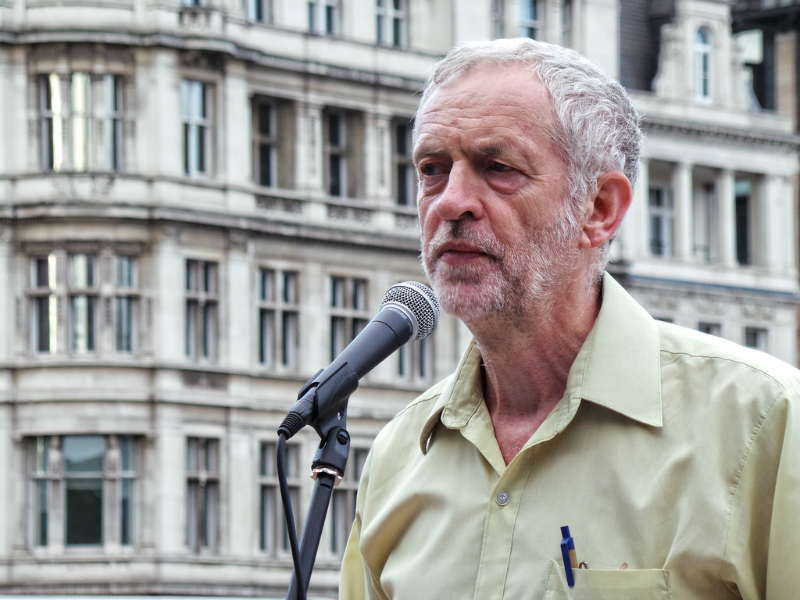U.K. Labour Leader Jeremy Corbyn is “a vicious anti-Semite and fellow traveller of terrorists,” Elliott Abrams, a former national security adviser to two U.S. presidents, told a Montreal audience. The British politician’s rising popularity is a reflection of the political left’s increasing attempts to delegitimize the Jewish state, he suggested.
The undermining of Israel’s existence is due, “quite simply, (to) hatred of Jews,” Abrams said at the 30th anniversary gala of the Canadian Institute for Jewish Research (CIJR) on Oct. 14.
“When one asks why Israel’s democracy is held to uniquely utopian standards, and why its self-defence is so controversial, and why Jewish nationalism is so widely viewed as wrong and dangerous, an honest answer is that anti-Semitism is still with us,” he said.
Abrams served as deputy national security adviser to former U.S. president George W. Bush, overseeing U.S. policy in the Middle East, and also advised former president Ronald Reagan. He is now a senior fellow in Middle Eastern studies at the Council on Foreign Relations, a think tank based in Washington, D.C.
In his address, Abrams compared the situation of Israel and the Jewish people today with 1988, when the CIJR was created.
“Jews were far safer walking the streets of London or Paris or Munich or Malmo when CIJR was founded than they are today,” Abrams said.
READ: THE MOST DANGEROUS MAN IN THE WORLD
In his opinion, Israel faces three main “threats”: a strengthening and increasingly influential Iran, the “diminishing” U.S. influence in the Middle East and the “ideological” campaign against it, led largely by the left.
That campaign denounces Israel as illegitimate, because of its supposedly weakening democracy and increasing nationalism, he said.
“If, as it seems, Israel cannot be destroyed by war or by terrorism, and the enthusiasm for a Palestinian state has diminished, the anti-Israel argument can be, and has been, transmogrified into one that alleges that Israel, per se, deserves endless attacks because it is not a democratic state – or is a state whose democracy is collapsing.”
The left holds that nationalism is “atavistic and primitive” and leads to war, so therefore Zionism – Jewish nationalism – must be condemned, he continued.
But Israelis, given what they face all around them, cannot afford these “utopian visions.” Today, Israel faces terrorist threats from Gaza, Sinai and Syria that are worse than those once posed by the PLO, he said.
Furthermore, U.S. President Donald Trump has shown “a new determination to escape conventional wisdom and take positions that even friendly administrations have long thought too difficult,” with regard to the Israeli-Palestinian conflict, Abrams said. However, the U.S. is no longer the dominant power in the Middle East and, with little popular support for further involvement in the wake of the Iraq and Afghan wars, that trend is likely to continue.

“I would argue that reversing the trend toward withdrawal will not be as hard as may appear now. It will require strong presidential leadership and it will require an understanding that Islamist extremism can ultimately only be defeated by better ideas and not alone by bullets,” he said.
Polls show that Americans still believe the U.S. should more to spread democracy peacefully, he added.
“I believe there is a consensus (in Washington), perhaps largely hidden by all the partisanship, that Iran must be stopped from ruling that Shia crescent from the Afghan border and west through Iraq, Syria and Lebanon, to the sea, and to the Israeli border.
“It is up to the best American political leaders and opinion leaders to evoke that consensus and build it up, and combat the pessimists and isolationists who see in the region no real U.S. interests that can and must be protected.”
On the positive side, Abrams noted that the boycott campaign against Israel has not stopped foreign direct investment in the country from rising dramatically, notably from China.
“Thirty years ago, Israel’s per capita GDP was just under $11,700 and today it is over $36,000. In 1988, Israel’s per capita GDP was lower than that of Greece and just slightly above Portugal,” he said.
“Today, it is twice that of Greece or Portugal, slightly higher than that of the U.K. and is 90 per cent of Canada’s.”
Trade with China is now 200 times what it was 30 years ago, and trade with India is growing rapidly, he added.
The gala, held at Beth Zion Congregation, also heard from Gen. Moshe Ya’alon, who served as Israel’s defence minister from 2013 to 2016 and earlier as deputy prime minister.
The theme of the evening was a tribute to the 70 years of the Israel Defence Forces.
